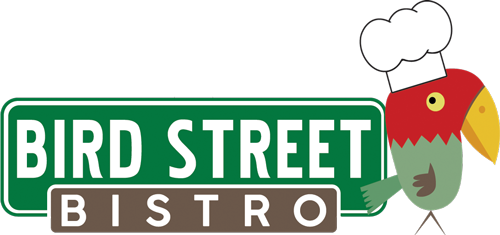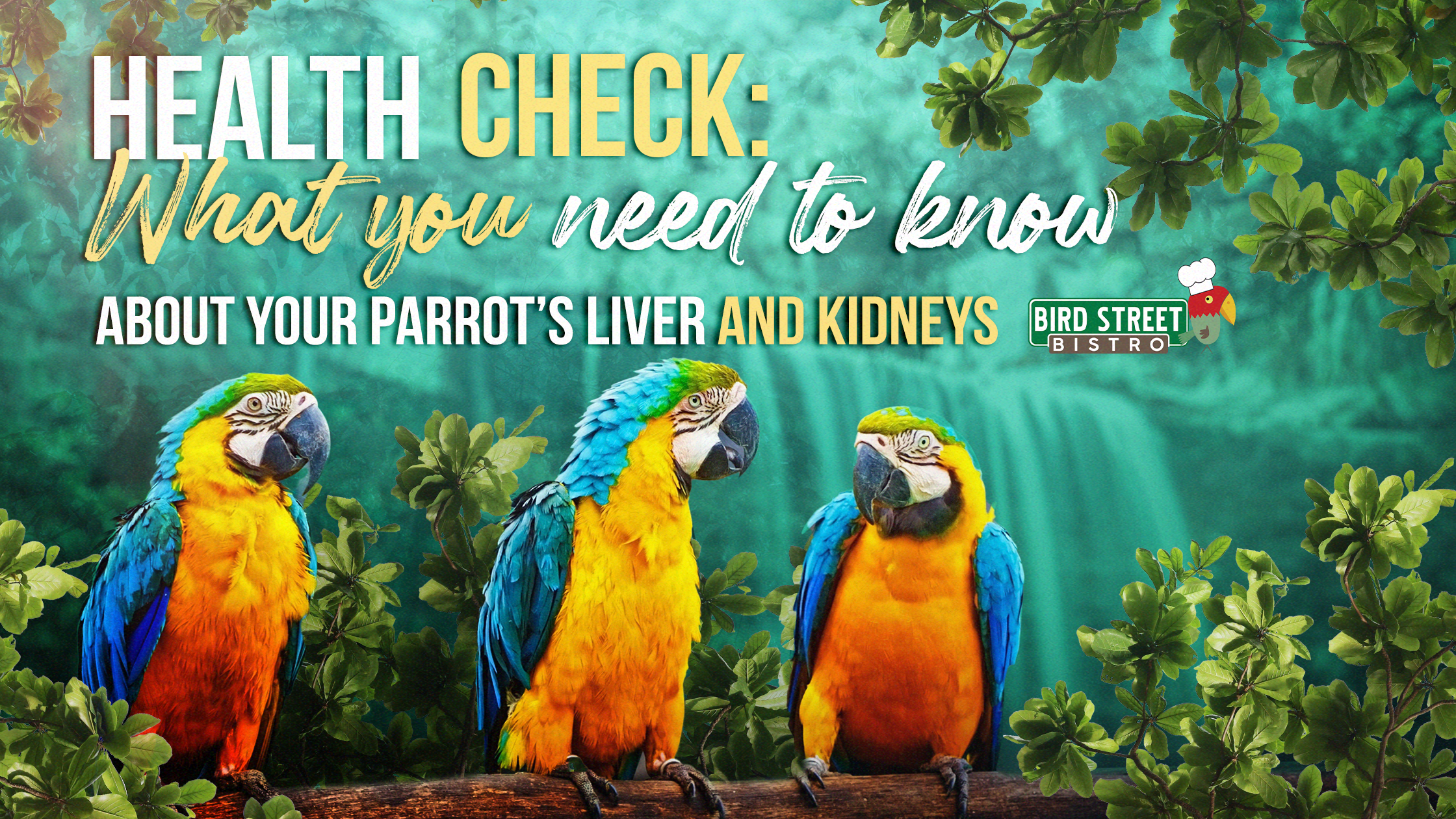Health Check: What You Need to Know About Your Parrot's Liver and Kidneys
What You Need to Know About Your Parrot's Liver Health
Unfortunately, parrots are prone to liver disease. Along with parakeets and cockatiels, Amazon parrots are at specific risk for liver issues. Often, parrot liver problems are caused by a bird's inability to digest high amounts of certain types of fats and proteins. Liver problems in parrots can also be caused by excess toxins from mold, exposure to chemicals, exposure to toxic plants, tumors, metabolic disorders, and nutritional deficiencies. A diet that it not uniquely formulated for the delicate biology of parrots is often the cause behind a liver issue in a pet parrot."You may see many different signs such as a fluffed, listless bird, depression, anorexia, wet droppings, yellow or green stained urates, (the urates are normally white), increased thirst, regurgitation, difficulty breathing and/or a swollen, puffy abdomen," according to Rick Axelson, DVM, at VCA. The translation is that your parrot may be giving subtle and not-so-subtle signs that all is not well with his liver,. Here's a full rundown of the common signs of parrot liver problems:
-

Your bird is acting listless or depressed.
-
Your bird is staying in a "fluffed" position without much movement.
-
Your bird has lost interest in food.
-
Your bird seems to have labored breathing.
-
Your bird has a swollen, puffed abdomen.
-
You're noticing wet droppings.
-
You're noticing yellow or green coloring in the white parts of your bird's droppings.
-
You're noticing that your bird's water supply needs to be replenished more frequently due to excessive thirst.
If your parrot is specifically suffering from fatty liver disease, you may notice some very obvious "cosmetic" symptoms. The first is that your bird will look fatter. Typically, you'll notice fat deposits fixed to your bird's chest area. Another sign of fatty liver disease in parrots is an overgrown beak. If your bird's beak seems to be growing abnormally large, it could be a sign that something is wrong . You may also see black spots that show up on the beak or toenails. The reason for this is that a fatty liver actually drastically inhibits your bird's ability to clot blood. Of course, the actual enlarged liver behind it all can be very hard to spot unless you're a trained vet with the right diagnostic tools.
. You may also see black spots that show up on the beak or toenails. The reason for this is that a fatty liver actually drastically inhibits your bird's ability to clot blood. Of course, the actual enlarged liver behind it all can be very hard to spot unless you're a trained vet with the right diagnostic tools.
"Obesity with the resultant fatty liver disease is one of the most common nutritional diseases that we see in birds. This is due to the high fat seed diet that they normally consume," according to Animal House of Chicago. Many well-meaning parrot owners assume that all-seed or all-pellet diets provide birds with the total nutrition they need. The fact that so many mainstream bird-food companies market their products as "total nutrition" products makes it difficult to know otherwise. Traditionally, seeds were used simply because people didn't have access to the bird science to know any better. In addition, dried seeds are viewed as being convenient. In addition to being high in fat, seeds also tend to be low in certain vitamins that help to protect parrots from common illnesses and diseases. Parrots on all-seed diets simply don't receive the same variety as they would if they were swooping from branch to branch in their natural tropical habitats. Wild parrots forage on a bewildering array of foods, depending on the season and availability," says the World Parrot Trust. In addition to providing fruit and vegetables, a proper parrot diet should consist of grasses, grains, and proteins like quinoa, spelt, and beans. If you're looking for the rare parrot food on the market that provides this, skip ahead to the Bird Street Bistro menu of irresistible mixes! Ideally, fats should only account for roughly 2 percent to 4 percent of a parrot's diet. Many popular seed mixes contain 20 percent fat. According to Parrot Society UK, protein should account for between 10 percent and 15 percent of a parrot's total dietary intake. While pellets are slightly better for protein, they contain large percentages of carbohydrates by way of low-nutrition, highly refined grains and other fillers. This is problematic for a very specific reason. Protein intake among parrots may need to be higher during times of great growth, molting, or recovery. Unfortunately, parrots in stages where that extra protein is needed will actually try to seek it by overeating seeds or pellets. This can put the parrot's health in jeopardy if you're using an all-seed or pellet mix because they will be getting very high amounts of fats and carbohydrates.
The Big Dietary Mistake to Avoid for Parrot Liver Health
One of the easy mistakes to make as a caretaker of multiple birds is to provide all of your birds with the same "meal plan." For instance, we know that digestion in parrots can change as they age. If you have a large parrot like a macaw or African grey, you may have already noticed that these parrots lack "self-control" around high-fat nuts and seeds. Macaws and African greys will use their large, dexterous beaks to selectively eat these favorites while neglecting other options when presented with seed mixes. That means that a mix of healthy parrot food that works for a bird with a little more self-regulation can be nutritionally dangerous for a larger parrot. The big takeaway is that a balanced diet consisting of healthy parrot food is the secret to balanced liver function in parrots. The lack of variety in all-seed and pellet diets can really wreak havoc on a parrot's very delicate liver. It's important to remember that liver issues don't show up "overnight" in a parrot. You may not have realized that your bird's diet was causing health issues because parrots can often go several years on a poor diet before showing signs of trouble. Ultimately, a fatty liver is a life-threatening issue for a parrot if dietary changes and proper treatment are not implemented. Next, we'll take a look at the role of the kidneys in a parrot's health.
What You Need to Know About Your Parrot's Kidney Health
Kidney dysfunction is something that's fairly common in pet birds. Typically, this is something that isn't seen until a bird is older. However, poor nutrition can cause very serious kidney issues to crop up much sooner in some parrots. Much like the human kidneys, parrot kidneys filter waste from the blood into the urine. The kidneys can essentially be looked at as your birds waste-filtering system. You can see why it's so important to make sure that the kidneys are thriving. How can you know if your parrot is having kidney problems? According to Beauty of Birds, these are the common signs of poorly functioning kidneys in parrots:- Drinking increased amounts of water.
- Increased urination.
- Watery droppings.
- An enlarged abdomen.
- Vomiting/regurgitation.
- Constipation.
- A sudden inability to fly.
- Swollen joints.
- Depression.
- Lethargy
- Constant fluffed feathers.
- Loss of appetite.
- Weight loss.
- General weakness.
- Blood in droppings.
- Crinkly skin around the eyes.
There can be several underlying causes of kidney failure in birds. For instance, we know that viral, bacterial, and fungal infections are all associated with increased risk of renal failure. Exposure to heavy metals and pesticides can also trigger kidney failure. That's why it's so important to vet your bird's cage, food dish, and toys to ensure that no potentially hazardous materials are present. Overall, dietary factors are often behind kidney problems in parrots. A vitamin deficiency caused by a diet lacking appropriate parrot food may be behind a kidney condition. Specially, a vitamin A deficiency (hypovitaminosis) is linked with kidney disease in birds. Unbeknownst to most bird owners, all-seed formulas are notoriously low in vitamin A. We strongly suggest parrot owners learn more about the importance of vitamin A.
The Gout Factor
Gout is also linked with kidney issues in parrots. Like human gout, avian gout occurs when the level of uric acid in the blood outpaces kidney function. A parrot with gout concentrated in the joints, ligaments, or tendons will often have areas that are swollen, tender, and warm to the touch. A telltale sign of gout is that your bird suddenly develops a preference for sitting on a flat surface instead of a perch. Here's a look at some other telltale signs of avian gout:- Your bird becomes agitated or noisy when you prompt it to walk.
- Your bird's feathers are nearly always ruffled.
- Your bird has a moist vent.
- Your bird appears dehydrated.
"Male birds are susceptible to articular gout, and the common age for this affliction is four months and above," according to PetMD. We also know that the same buildup of uric acid that forms when a parrot is suffering from gout can also concentrate in the kidney as a kidney stone. Like most avian health issues, kidney problems are often triggered by nutritional imbalances or deficiencies.
The Causes of Kidney Problems in Parrots
One of the most common diet-related causes of kidney issues in parrots is excessive vitamin D. If a bird doesn't have a balanced diet to pull nutrients from, the bird may overeat on seeds or pellets to overcompensate for a lack of protein or other nutrients. As a result, birds may be essentially "overdosing" on seeds and nuts that are naturally high in vitamin D.
What to Do If You Suspect That Your Parrot Has a Liver or Kidney Issue
Ideally, the time to address liver or kidney issues is before your bird ever has a problem! From the time you take your beautiful bird home, it's important to be proactive about providing a balanced diet with the right nutrition to allow your bird to process vitamins, minerals, and nutrients for energy and growth. This can be done by providing your bird with the fully organic, all-natural, and filler-free blends offered by Bird Street Bistro.

If you suspect that your parrot is showing signs of a liver or kidney issue, veterinarian intervention is crucial. A vet will be able to perform diagnostic tests to confirm a health issue. In most cases, various treatments and therapies can be used to help nurse your parrot back to health. Your vet will also speak with you about any dietary changes that need to be made to ensure good health for your bird going forward. You may also want to talk to your vet about supplementation. For instance, larger parrots like macaws often need higher levels of vitamin A to stay looking glossy and feeling healthy when compared to other parrots. The team at Bird Street Bistro wishes your bird health and wellness! If you're looking for an easy, tasty way to give your bird complete and appropriate nutrition, join our flock. Our tasty parrot food is a fan favorite from Amazons, macaws to tiels!
- Choosing a selection results in a full page refresh.
- Press the space key then arrow keys to make a selection.


